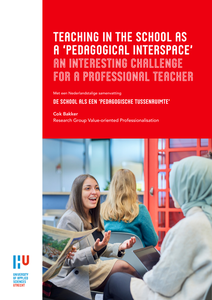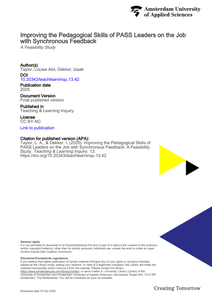This article explores how schools can function as a pedagogical in-between space, or a pedagogical inter-space, and how lecturers can act professionally within this space, of which they themselves are also a part. Met een samenvatting in het Nederlands: De school als een ‘pedagogische tussenruimte’.
DOCUMENT

Peer assisted study sessions (PASS), also known as Supplemental instruction, are structured peer guided sessions linked to a specific course, led by experienced and trained students called PASS-leaders. These PASS-leaders undergo several days of training before running their first session and receive supervision and feedback ‘on the job’. Research suggests that training improves student outcomes whereby supervision is considered best practice, as required by PASS protocols. However, it is unclear what type of supervision best supports PASS-leaders. Thus far, studies have not compared different methods for on-the-job interventions. Current practice involves supervisors observing PASS sessions without intervening but providing post hoc feedback. While this prevents undermining the PASS leaders, it delays their ability to act on feedback immediately. This study, carried out at an institution for initial teacher education, developed and tested a method for providing immediate feedback using a bug-in-ear device linked to a live-stream. Six PASS-leaders were observed during 4-6 sessions each, receiving either synchronous feedback with a bug-in-ear or in-person asynchronous post hoc feedback. In group interviews PASS-leaders reported appreciating the immediacy of synchronous feedback which allowed them to act on it in real-time. The surveys after each lesson indicated that they felt significantly more confident about teaching following live feedback. They described the supervisor as an invisible helper, providing support or assistance. Because the bug-in-ear method could only provide feedback on visible instructional and pedagogical actions, both PASS-leaders and PASS-supervisors recommended using this as a supplement to a pre-session briefing and a post-session debrief.
DOCUMENT

PCK is seen as the transformation of content knowledge and pedagogical knowledge into a different type of knowledge that is used to develop and carry out teaching strategies. To gain more insight into the extent to which PCK is content specific, the PCK about more topics or concepts should be compared. However, researchers have rarely compared teachers’ concrete PCK about more than one topic. To examine the content dependency of PCK, we captured the PCK of sixteen experienced Dutch history teachers about two historical contexts (i.e. topics) using interviews and Content Representation questionnaires. Analysis reveals that all history teachers’ PCK about the two contexts overlaps, although the degree of overlap differs. Teachers with relatively more overlap are driven by their overarching subject related goals and less by the historical context they teach. We discuss the significance of these outcomes for the role of teaching orientation as a part of PCK.
DOCUMENT

Online supplements to Smit, E., Tuithof, H., Savelsbergh, E., & Béneker, T. (2023). Geography teachers’ pedagogical content knowledge: A systematic review. Journal of Geography. https://doi.org/10.1080/00221341.2023.2173796 Supplement 1: Extended information on selected studies Supplement 2: Full references of studies used in the review Supplement 3: Codebook Abstract: Pedagogical Content Knowledge (PCK) is the knowledge teachers use to teach a specific subject to a specific audience. The importance of PCK to quality teaching is widely recognized. However, an overview of research about geography teachers’ PCK is missing. To fill this gap, we conducted a systematic review. We analyzed 43 empirical studies, but only 9 used PCK as a framework. Most studies addressed instructional strategies or teaching orientations. The studies were too diverse to draw conclusions on geography teachers’ PCK in general. But portraits of 16 geography teachers emphasized the necessity of geographical knowledge and teaching experience for PCK-quality.
MULTIFILE

Conducting large calculations manually with pen and paper following prescribed procedures or algorithms has been diminishing in significance for some time. In most cultures, and for many years already, individuals employ digital instruments for such computational tasks, when confronted with them in daily life. Yet, a closer examination of prevalent practices in the teaching of basic numeracy skills in adult education reveals a persistent emphasis on mastering standardized manual calculation techniques, especially with abstract and decontextualized numbers. This emphasis predominantly stems from the belief that mastering these manual procedures forms the cornerstone of all numeracy abilities. Contrastingly, our research indicates that the numeracy skills most frequently utilized and required in contemporary professions and daily activities encompass higher-order capabilities (Hoogland and Stoker, 2021; Boels et al., 2022; Hoogland and Díez-Palomar, 2022). These include interpretation, reasoning, mathematizing, estimation, critical reflection on quantitative data, and the application of digital instruments for computation. It is imperative, therefore, that numeracy education for adults prioritizes these competencies to achieve efficacy.
LINK
De lerarenopleiding speelt een belangrijke rol bij de voorbereiding van leraren in opleiding op het gebruik van technologie voor onderwijzen en leren. Uit de literatuur blijkt echter dat lerarenopleiders vaak moeite hebben om een doeltreffende ICT-integratie te modelleren. De bereidheid om ICT in het onderwijs te gebruiken heeft betrekking op het verwerven van kennis, vaardigheden en attitudes over het gebruik van technologie voor onderwijzen en leren. Wanneer deze bereidheid tot uiting komt in het feitelijke gebruik van technologie in de klas, en het vermogen om op dit gebruik te reflecteren, past dit in de conceptualisering van 'didactische ICT-competentie'. Een curriculumherziening op vijf locaties van de Lerarenopleiding Basisonderwijs (Pabo) van Hogeschool Inholland in Nederland vormde de aanleiding voor deze studie. Het doel van dit onderzoek is het meten van de perceptie van leraren in opleiding van de strategieën die lerarenopleiders gebruiken om de ontwikkeling van effectief gebruik van informatie- en communicatietechnologie (ICT) in de klas te ondersteunen. Het Synthesis of Qualitative Data (SQD) model definieert zes kernstrategieën voor de ondersteuning van leerkrachten in opleiding om ICT in het onderwijs te gebruiken, namelijk (1) rolmodellering; (2) reflectie over de rol van technologie;(3) leren van technologie door (her)ontwerpen van lessen; (4) samenwerken met collega's; (5) authentieke Teaching, Learning & Technology en (6) voortdurende feedback. De centrale vraag van dit onderzoek luidt: Hoe percipiëren leraren in opleiding van vijf lerarenopleidingen deze strategieën die lerarenopleiders gebruiken om de ontwikkeling van hun didactische ICT-competenties te ondersteunen? Er werd gebruik gemaakt van een mixed-methods onderzoeksopzet. De SQD-vragenlijst met 24 items (zespunts Likert-schaal) werd vertaald naar het Nederlands en uitgebreid met zes open vragen, die verdere uitwijding bij elk van de kernstrategieën mogelijk maakten. Vijf locaties van de Lerarenopleiding Basisonderwijs (Pabo) van Hogeschool Inholland in Nederland waren erbij betrokken. De strategieën "authentieke technologie-ervaring" en "rolmodellering door de lerarenopleider" worden het meest herkend. Het geven van voortdurende feedback was de minst erkende strategie omdat feedback vooral als summatief werd ervaren. De meerderheid van de lerarenopleiders werd niet herkend als rolmodel voor ICT-integratie. Lerarenopleiders in digitale geletterdheid echter wel. Hoewel de stages een ruimte bieden om te oefenen, worden de zittende leerkrachten niet erkend als inspirerende voorbeelden van ICT-integratie. Als leerkrachten in opleiding te weinig rolmodellen zien die vakspecifieke ICT-integratie tonen, ontwikkelen zij zelf geen doeltreffende ICT-integratie. Verder onderzoek zou zich moeten richten op de vraag hoe het aantal erkende strategieën kan verhoogd worden, te beginnen met het "geven van continue feedback".
DOCUMENT

Mentor teachers need a versatile supervisory skills repertoire. Besides taking the prevalent role of daily advisor and instructor, mentor teachers should also be able to stimulate reflection in student teachers. Video recordings were analyzed of 60 mentoring dialogues, both before and after a mentor teacher training aiming at developing the encourager role. Mentor teachers' repertoires of supervisory skills were found to consist of an average of seven supervisory skills. After training, a shift was observed in the frequencies and duration with which supervisory skills were used. Although considerable inter-individual variability existed between mentor teachers, training positively affected the use of supervisory skills for stimulating reflection in student teachers.
DOCUMENT

In this study, a data feedback program to improve teachers’ science and technology (S&T) teaching skills was designed and tested. The aim was to understand whether and how the four design principles underlying this program stimulated the intended teacher support. We examined how teachers in different phases of their career applied and experienced the employed design principles’ key aspects. Eight in-service teachers and eight pre-service teachers attended the data feedback program and kept a logbook in the meantime. Group interviews were held afterwards. Findings show that applying the four employed design principles’ key aspects did support and stimulate in- and pre-service teachers in carrying out data feedback for improving their S&T teaching. However, some key aspects were not applied and/or experienced as intended by all attending teachers. The findings provide possible implications for the development and implementation of professional development programs to support in - and pre-service teachers’ S&T teaching using data feedback.
DOCUMENT

This literature review reports on the assumed relations between primary school teachers' knowledge of technology and pupils' attitude towards technology. In order to find relevant aspects of technology-specific teacher knowledge, scientific literature in the field of primary technology education was searched. It is found that teacher nowledge is essential for stimulating a positive attitude towards technology in pupils. Particularly, teachers' enhanced Pedagogical Content Knowledge is found to be related to pupils' increased learning and interest in technology. Six aspects of technology-specific teacher knowledge that are likely to play a role in affecting pupils' attitude are identified and schematically presented in a hypothetical diagram. It is concluded that more empirical vidence on the influence of technology-specific teacher knowledge on pupils' attitude is needed. The hypothetical diagram will serve as a helpful tool to investigate the assumed relations between teacher knowledge and pupils' attitude empirically.
LINK
This paper presents three lesson activities for upper secondary education that focus on learning subject specific knowledge and general system thinking skills by creating a qualitative representation. The learning goals and the pedagogical approach are described.
DOCUMENT
